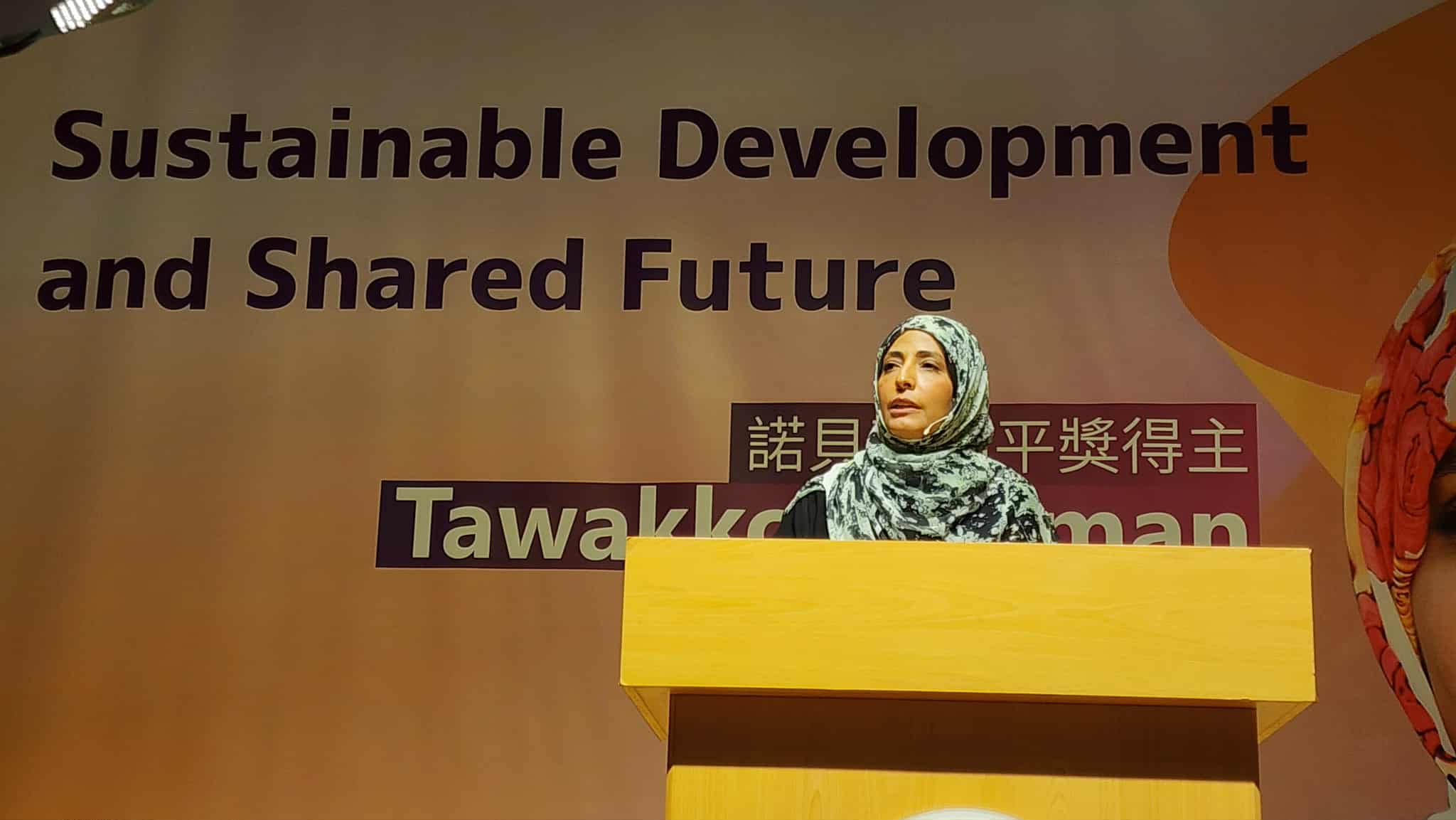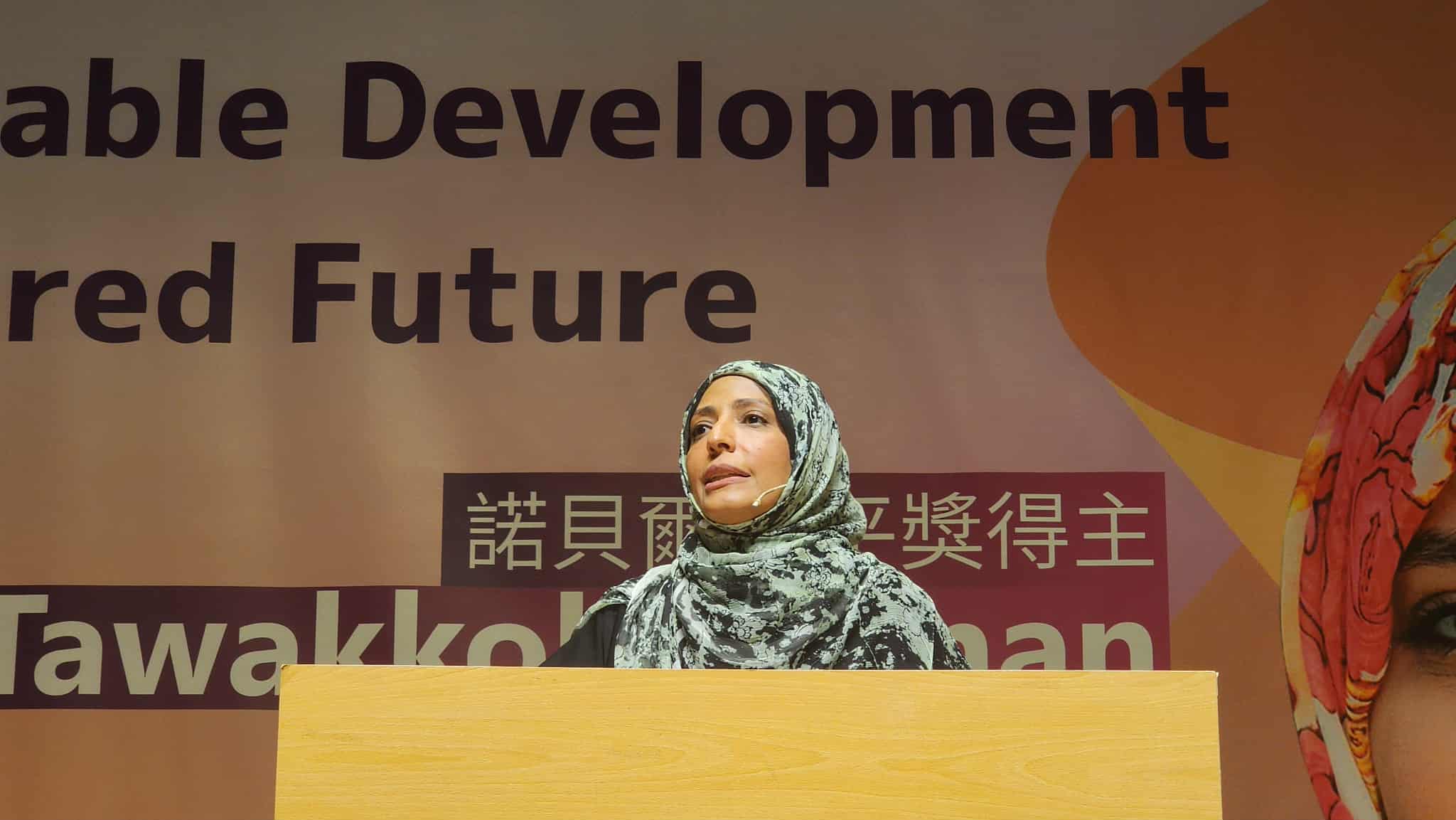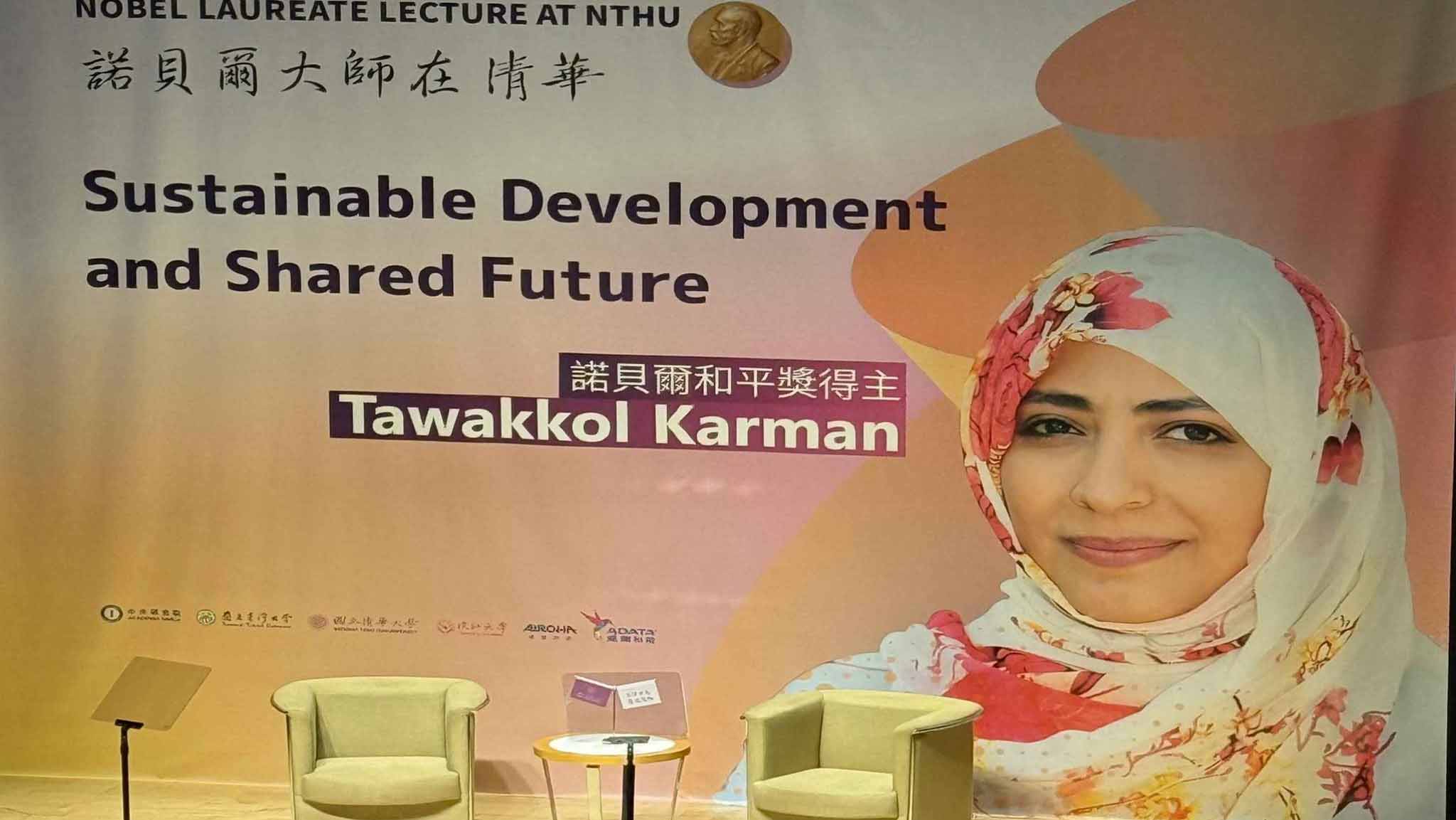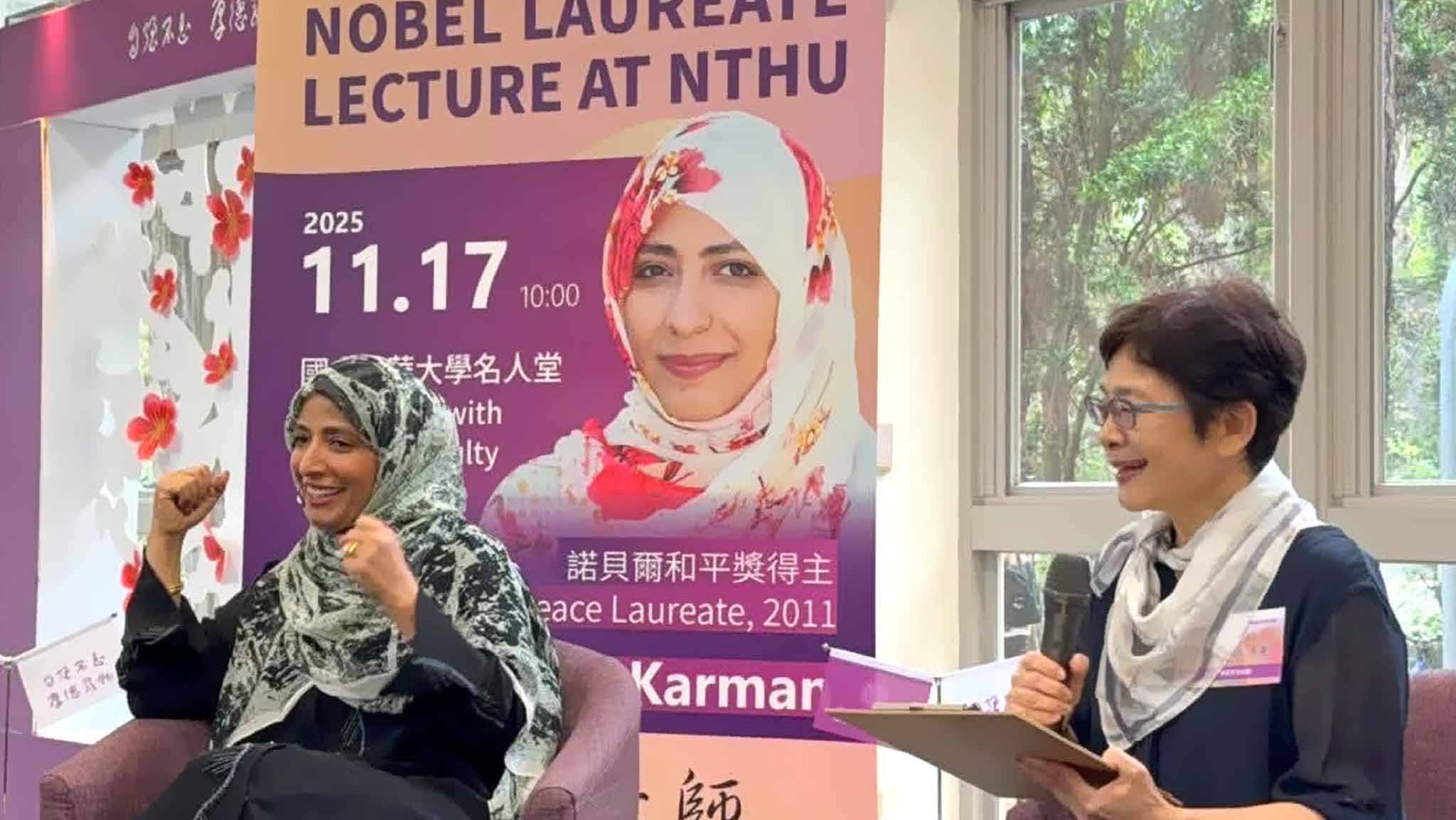Human rights advocate and Nobel Peace Prize laureate Tawakkol Karman delivered an address in Taipei, calling sustainable development “an existential necessity that will determine the fate of our world.”
Speaking at the “Bridges” Event Series during a conference titled “Sustainable Development and Our Common Future” at National Tsing Hua University in Hsinchu, Taiwan, Karman emphasized that humanity is living through a decisive moment in which climate, the economy, human security, and social justice are deeply interconnected.
Karman said that the lessons of recent decades have shown that an economy driven purely by profit exhausts its resources, a world that neglects the environment threatens its own survival, and societies that ignore justice pave the way for instability and extremism. She stressed that sustainable development offers a comprehensive framework capable of guiding global action toward what is both possible and urgently required.
In her remarks, Karman described sustainable development as a balance between meeting the needs of the present and safeguarding the rights of future generations. She highlighted the responsibility to build strong economies without harming the environment, to create wealth without stripping people of dignity, and to manage natural resources without depriving coming generations of clean air, water, and access to life-supporting ecosystems.
Sustainability, she said, is not limited to environmental policy but reflects a broader commitment to fairness, inclusion, and responsible governance.
Warning that humanity is consuming natural resources at a pace the planet cannot sustain, Karman called for a moral approach to development—one rooted in protecting the planet as a trust to be handed to future generations.
She stressed that transitioning to renewable energy is no longer optional but the strongest defense against climate change.
Karman also underscored the need for an ethical economy that serves human dignity. She argued that true development cannot exist in societies marked by poverty, discrimination, or collapsing public services, and said that combating poverty, empowering women, and supporting marginalized groups are essential foundations for stability and peace.
Addressing global conflicts, Karman said sustainable development and peace are inseparable, noting that no country can pursue development amid war or occupation.
She pointed to Gaza, Yemen, Sudan, and Ukraine as examples of regions where conflict has destroyed infrastructure and erased development gains.
Karman concluded by addressing young people, urging them to take an active role in shaping the future. She praised Taiwan and National Tsing Hua University for hosting the event, saying the future begins with initiative, creativity, and the willingness to act.
Presented below is the full address:
Peace be upon you all, and thank you.
It is my honor to stand before you today to speak about an issue that is no longer a theoretical concept or a political option, but a profound existential necessity—one that will define the fate of our world: sustainable development.
We live in a defining historical moment—one in which climate intersects with the economy, human security intersects with social justice, and all challenges converge to tell us clearly:
The future of humanity is no longer something we can postpone; it is a responsibility we must assume today, now, and in every decision we make.
The past decades have taught us hard truths:
A world driven solely by profit wastes its resources;
a world that neglects the environment endangers its own survival;
and a world that ignores social justice opens the door to tyranny, poverty, conflict, and extremism.
From this reality emerges sustainable development as a comprehensive framework—one that redirects our compass toward what is possible, and toward what is necessary.
Sustainable development is the balance between what we need today and what must remain for the coming generations tomorrow.
Sustainable development, in its essence, is a promise:
It is a simple idea with a powerful impact:
to build a strong economy without destroying the environment;
to create wealth without leaving millions outside the circle of dignity;
to use the planet’s resources without stealing the rights of future generations to water, air, forests, and life.
And when we talk about sustainability, we are not speaking solely of the environment.
We are speaking of a fairer economy, a more inclusive society, and governance grounded in responsibility.
A world whose strength is measured not by its factories, but by the opportunities it creates for every human being—and by how well it protects its resources and respects its environment.
Dear friends
One of the gravest dangers facing humanity today is that we consume the planet’s resources as if they belong solely to us.
We take from the earth more than it gives, from forests more than they can grow, and from oceans more than they can renew.
We are a generation living in a way that—if continued—will make our children’s lives far more difficult than ours.
Here, sustainable development stands first and foremost as a moral philosophy before it becomes a development policy:
• To plant a tree not for our shade, but for the next generation’s.
• To leave our rivers clean for those who will be born after us.
• To protect life on this planet because it is not ours alone—it is a trust we must honour.
The transition to renewable energy is not a luxury; it is our strongest shield against climate change.
Dear Friends, The Economic Dimension — An Economy That Serves Humanity
We live in a world dominated by powerful corporations and narrow interests, where the value of nations is too often measured by the size of their markets rather than the dignity of their people.
Sustainable development brings a different message:
The economy is not an end—it is a means to create a dignified life.
An economy without justice is discrimination.
An economy without ethics is exploitation.
An economy without humanity is destruction.
We need an ethical economy built on:
• innovation that uplifts rather than crushes,
• technology that serves humanity—not authoritarian regimes,
• companies accountable to society and the environment,
• investments that respect workers’ rights,
• and markets that are not built on the suffering of the poor.
Sustainable development redefines economic success:
not by what we accumulate, but by what we contribute to the world.
And investment in education and health is not a burden—it is the foundation of any lasting development.
Dear Friends: The Social Dimension — No Development Without Justice
No nation can speak of development while half its population lives below the poverty line, while its schools crumble, while women are denied rights, minorities are excluded, refugees suffer, and youth face a future without hope.
Development means that every human being lives in dignity:
• That the poor can rise, not remain trapped.
• That education is real and of quality—not broken and hollow.
• That women are full partners, not victims of violence and discrimination.
• That children are protected from war, ignorance, and hunger.
Sustainable development teaches us:
No justice without equality.
No progress without rights.
No stability without ending poverty.
And no peace without accountability for oppressors.
Fighting poverty, empowering women, and supporting marginalized groups are not humanitarian slogans—they are conditions for stability, prosperity, and peace.
Dear friends: Sustainable Development and Peace — One Cannot Exist Without the Other
War is the enemy of development.
You cannot build an economy in a burning country,
nor justice in a plundered one,
nor a clean environment in a land filled with smoke and explosives.
Look around us:
• Gaza, where schools, hospitals, and universities have been bombed and entire infrastructures erased.
• Yemen, consumed by war despite its vast potential.
• Sudan, where conflicts are erasing entire generations.
• Ukraine, where development is devoured by conflict.
We cannot speak of sustainable development without ending occupation, halting wars, prosecuting war criminals, and building an international system that puts human beings before interests.
Democracy is also essential to sustainable development.
Democracy is not a luxury; it is the condition for prosperity, security, and creativity.
It has become clear that environmental, economic, and social security are pillars of a single, comprehensive security—one that cannot be separated from the others.
If we want a safe world, we must work to end inequality, protect resources, and expand the circles of justice.
Sustainable development is everyone’s responsibility: governments first and foremost, but also universities, businesses, leaders, young people, and every individual on this planet.
Before it is a policy, it is a new consciousness and a new way of thinking—one that puts people at the center, protects the environment, and redefines progress as progress for all people, not just one group over another.
Taiwan — A Model for Our Shared Future
Taiwan is not merely an island or a successful economy; it is a global symbol of creativity, resilience, and free will. In a highly sensitive geopolitical region, Taiwan’s security shapes global markets, technology, and the stability of the Indo-Pacific. Its success is a testament to one truth: Taiwan succeeded not despite democracy, but because of it.
Freedom of knowledge, research, civil society, and accountable governance have become engines of Taiwan’s development.
At the same time, even strong democracies face challenges, and Taiwan is no exception.
The island struggles with energy dependence, recurring water shortages, rising housing costs, , and pressures on labor and social inclusion. These issues demand bold policies and open national dialogue.
Yet these challenges do not overshadow Taiwan’s achievements—they highlight its resilience.
A confident nation is one that confronts its shortcomings and transforms them into opportunities.
Through its freedom, science, and humanity, Taiwan remains a beacon of hope for the region and the world.
Dear Young people:
To the youth:
You are the generation that does not wait for circumstances—you create them.
You possess tools no previous generation ever had:
artificial intelligence, technology, global communication, entrepreneurship, awareness, courage, and knowledge.
With these tools, you can rebuild a more just and humane world.
Your role is to innovate, to challenge, to break old molds, to open new doors, and to build development models based on action—not on waiting.
Do not wait for others to shape the future.
The future will be written by your hands—by your creativity, your courage, and your determination to build a better world.
Thank you, Taiwan.
Thank you, National Tsing Hua University.
And thank you to everyone who believes that the future begins with a word… a step… and a dream.





